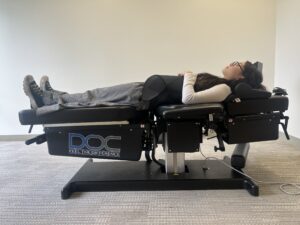Overview of Peripheral Neuropathy
Peripheral neuropathy is a condition that refers to the damage or disease of nerves outside the brain and spinal cord. There are different types of peripheral neuropathy, including carpal tunnel syndrome and diabetic neuropathy. This condition can have a significant impact on physical sensations, such as tingling, numbness, and burning sensations. It can also affect motor nerves, sensory nerves, and internal organs, leading to muscle weakness, balance issues, and digestive problems. Guillain-Barre syndrome and hereditary neuropathies like Charcot-Marie-Tooth disease type 1 are serious forms of peripheral neuropathy.
Peripheral neuropathy can be a challenging condition to live with, as it can significantly impact a person’s daily life and overall well-being. However, with proper diagnosis and treatment, many individuals are able to effectively manage their symptoms and improve their quality of life.

Peripheral Neuropathy in San Francisco
For example, Sarah, a 45-year-old woman, was diagnosed with peripheral neuropathy after experiencing persistent numbness and tingling in her hands and feet. She also noticed that she was having difficulty with balance and coordination. After consulting with her doctor, Sarah underwent a series of tests, including nerve conduction studies and blood tests, to determine the underlying cause of her symptoms. It was discovered that Sarah had developed peripheral neuropathy as a result of uncontrolled diabetes.
Additional reading: Nerve Pain: Your Body’s Alarm System
Common Symptoms of Peripheral Neuropathy
The symptoms of peripheral neuropathy can vary between individuals and depend on the type of nerve damage. Common symptoms include numbness, tingling, and pain. People with peripheral neuropathy may also experience a lack of coordination and muscle weakness. Autonomic problems can arise, causing excessive sweating, shortness of breath, dizziness, and digestive issues. It is important to seek medical care if you experience these symptoms to receive a proper diagnosis and appropriate treatment.
In addition to these common symptoms, peripheral neuropathy can also cause changes in sensation. For example, some individuals may experience a loss of sensation in certain areas of the body, while others may have heightened sensitivity to touch. These changes in sensation can make everyday tasks more challenging and increase the risk of injury.
For instance, John, a 60-year-old man, began to notice that he was having difficulty feeling the temperature of objects with his hands. He would accidentally touch hot surfaces without realizing it, resulting in burns. John also experienced a constant tingling sensation in his feet, which made it difficult for him to walk comfortably. After consulting with a neurologist, John was diagnosed with peripheral neuropathy due to his long-term alcohol misuse.
Causes and Risk Factors of Peripheral Neuropathy
Peripheral neuropathy can have various causes, including traumatic injuries, infections, metabolic problems, inherited disorders, exposure to toxins, and autoimmune diseases. One of the most common causes is diabetes. Other causes include infections, tumors, bone marrow disorders, and other diseases. There are also several risk factors associated with peripheral neuropathy, such as diabetes, alcohol misuse, low vitamin levels, infections, autoimmune diseases, and repetitive motion. Complications of peripheral neuropathy can include burns, infections, and falls.
It’s important to note that not everyone with these risk factors will develop peripheral neuropathy, and some individuals may develop the condition without any known risk factors. The exact cause of peripheral neuropathy can vary from person to person, and in some cases, the cause may never be identified.
For example, Lisa, a 35-year-old woman, was diagnosed with peripheral neuropathy after experiencing persistent numbness and tingling in her hands and feet. She had no known risk factors for the condition, such as diabetes or alcohol misuse. After undergoing extensive testing, including blood tests and nerve conduction studies, Lisa’s doctors were unable to determine the exact cause of her peripheral neuropathy. She was diagnosed with idiopathic peripheral neuropathy, which means that the cause is unknown.
Diagnostic Tests for Peripheral Neuropathy
To diagnose peripheral neuropathy, doctors may use various tests. Nerve conduction studies measure the electrical activity of nerves and muscles, helping to identify any abnormalities. Electromyography (EMG) assesses muscle response to nerve stimulation and can help diagnose peripheral neuropathy. Blood tests may also be conducted to identify underlying causes or contributing factors to peripheral neuropathy. A comprehensive assessment, including a thorough medical history and physical examination, is crucial in the diagnostic process.
In addition to these tests, doctors may also perform a nerve biopsy to examine a small sample of nerve tissue under a microscope. This can provide valuable information about the cause and extent of the nerve damage.
For instance, James, a 50-year-old man, began experiencing tingling and numbness in his hands and feet. Concerned about his symptoms, he visited a neurologist who recommended a series of diagnostic tests. James underwent nerve conduction studies and EMG, which showed abnormal nerve function. Blood tests were also conducted, ruling out any underlying medical conditions. To further investigate the cause of his peripheral neuropathy, James underwent a nerve biopsy, which revealed inflammation in the nerves. Based on these findings, he was diagnosed with peripheral neuropathy caused by an autoimmune disorder.
Treatment Options for Peripheral Neuropathy
The treatment of peripheral neuropathy involves a multi-faceted approach. Lifestyle changes play a significant role, including maintaining a balanced diet, engaging in regular exercise, and avoiding factors that can cause nerve damage. Medications may be prescribed to manage symptoms and treat underlying conditions contributing to peripheral neuropathy. Physical therapy can help improve strength, balance, and coordination. In addition to conventional treatments, alternative therapies like chiropractic care, acupuncture, and specialized treatments offered by TruSpine, such as chiropractic adjustments, dry needling, and acupuncture, can provide relief from neuropathy symptoms. Personalized treatment plans should be developed to address each individual’s needs, and may include other modalities like Graston Technique, Active Release Technique, ultrasound therapy, laser therapy, and shockwave therapy.
It’s important for individuals with peripheral neuropathy to work closely with their healthcare team to develop a treatment plan that is tailored to their specific needs. This may involve a combination of different treatments and therapies to effectively manage symptoms and improve quality of life.
For example, Maria, a 55-year-old woman, was diagnosed with peripheral neuropathy as a result of chemotherapy treatment for breast cancer. She experienced severe pain, numbness, and tingling in her hands and feet, making it difficult for her to perform daily activities. Maria’s treatment plan included a combination of medications to manage her pain, as well as physical therapy to improve her strength and mobility. She also sought alternative therapies, such as acupuncture, to complement her conventional treatment. Over time, Maria’s symptoms improved, and she was able to regain some of her functional abilities.
Trusted Peripheral Neuropathy Treatment in San Francisco
Recognizing the warning signs of peripheral neuropathy is crucial for early intervention and proper management of the condition. If you or someone you know is experiencing symptoms of peripheral neuropathy, it is important to seek medical care for an accurate diagnosis and appropriate treatment. TruSpine, a chiropractic office specializing in neuropathy care, offers personalized treatment strategies to address peripheral neuropathy and provide lasting relief. By visiting their website and scheduling a consultation, you can take proactive steps towards managing peripheral neuropathy and improving your quality of life. Don’t let peripheral neuropathy hold you back – reach out to TruSpine today for expert care and support.
At TruSpine, your well-being is our top priority. If you’ve recognized any of the warning signs of peripheral neuropathy discussed in this blog, don’t wait to seek help. Our experienced team in San Francisco, CA, is here to provide the specialized care and support you need to manage and alleviate peripheral neuropathy treatment and symptoms. Don’t let this condition limit your life any longer. Reach out to us today to schedule a consultation and take the first step towards a more comfortable and fulfilling future. Your journey to relief begins with TruSpine, and we’re here to guide you every step of the way.
Truspine
150 Lombard St Ste 2, San Francisco, CA 94111
(415) 421-1115



